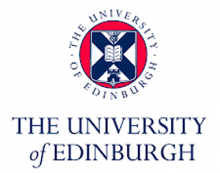
The University of Edinburgh is a comprehensive research university with charity status founded in 1583 with approx. 41,000 students, 7,100 academics, 7,400 administrative and support staff. Its 3 Colleges and 20 Schools offer a number of undergraduate, Masters, and doctoral programmes covering all fields of knowledge. The university is deeply embedded in the fabric of the city of Edinburgh, with many of the buildings in the historic Old Town belonging to the university and 7 campuses across the city.
The UoE is ranked 18th in the world in the 2019 QS Rankings and maintains collaborative links with 600 partner universities in over 100 countries around the world. The Research Excellence Framework ranking used by the UK government to determine future research funding lists Edinburgh as 4th in the UK for research power, with Computer Science and Informatics ranking 1st in the UK. The UoE is deeply integrated in the local community and committed to excellence in learning, teaching, and research, as well as knowledge exchange and impact on society.
The UoE is one of the largest and most international universities in the UK, as reflected in its student population, which comprises over 5,200 European students and 13,200 International students from over 130 different countries. It can also be found in its truly international staff and in its joint research and other links with overseas universities, institutes, companies and governments. Beyond its leading position in mobility, the UoE is a member of networks such as the Coimbra Group, the Russell Group, Universitas 21, and the League of European Research Universities.
The UoE has a strong commitment to internationalisation of all its activities: teaching, research, knowledge exchange, innovation, and outreach. Mobility for all sectors of the university and of all kinds plays a central role in the institutional international strategy. Edinburgh Global, previously the International Office, pioneers the internationalisation agenda and manages all student credit-bearing mobility as well as short-term international experiences for students and staff.
DIGIPASS aims to improve the impact of mobility experiences for students by providing a holistic approach to online mobility support. It seeks to complement current projects, such as Erasmus without Paper, European Student Card, Online Learning Agreement and Erasmus App, by focusing on the soft skills required for, and gained through, a successful mobility experience. There is a clear need for improving online support in areas such as career guidance, intercultural communication and mental well-being while abroad, as many students report that the current level of guidance is insufficient to help them realise the full potential learning benefits of their mobility.
DIGIPASS will create a modular training programme to support students throughout the entire mobility lifecycle. Once developed, the training programme will be delivered via online learning tools which students can access while abroad. The project will also produce a toolkit which provides support to staff who support students on their mobility journey as well as a handbook and framework for policymakers. The online training programme, staff toolkit and handbook/framework will all be made available as open education resources at the project’s conclusion so that higher education institutions throughout Europe and beyond can use the DIGIPASS outputs to enhance their own existing support systems and help embrace their students’ digital skills.
Contact support: goabroadprojects@ed.ac.uk
